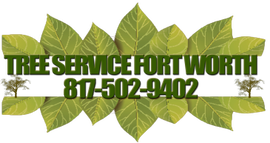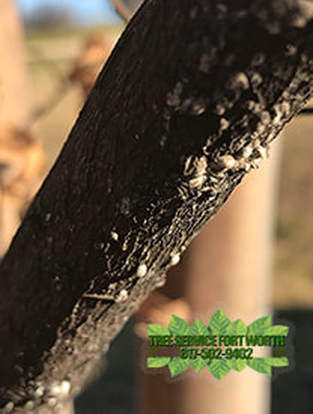Scale Insect Treatment in Fort Worth, TX.
What Causes Scale Insects?With over eight thousand different species, scale insects are exceptionally plentiful and common throughout Fort Worth and North Texas and are part of the superfamily group of insects known to certified arborists as Coccoidea. Tree care specialists are encountering scale insects on a daily basis because these destructive pests thrive in warm, arid weather conditions as typified by summer climatic temperatures in the DFW area. Scale insects are very small, ranging in size from 1/16" to 1/4", are flattened and oval-shaped in appearance, vary in color from light tan to dark brown and have a waxy shell-like capsule to protect their body. |
These irritating tree and plant pests drink the sap from the leaves and deprive the tree of necessary nutrients and water, rendering the tree or plant with the appearance as if it has been subjected to drought and is in severe need of water. Once these insects attach themselves to either the underside of leaves or along the leaf vein they do not move, so frequently the insects are ignored or go unnoticed. First visible indications of scale insect infestation are a weakened, stressed appearance to the tree. Because scale insects can ultimately destroy the tree or plant if they are left untreated, contact an experienced tree company immediately for a professional diagnosis!
Diagnosing Scale InsectsThe tree evaluation report will be quickly prepared because the diagnostic process performed by an experienced plant pathologist is a swift and based-upon visual manifestation of scale insects, examination of the habitat soil and a thorough study of the tree's structural integrity and vigor. Infected trees always look weak and ailing because the scale insects are drinking the tree's sap and robbing the tree of needed nutrients. The canopy of the tree will have noticeable diminishing foliage, yellowish or brown curled or withered leaves and suffer premature leaf loss. |
These insects produce sticky honeydew that can leave black spots which appear as mold on the underside of leaves. Later stages of scale insect infestation will prevent the tree from having any new growth. Once scale insect infestation has been verified, the arbor care professional will explain the diagnosis report and prepare a personalized treatment plan and ongoing care and maintenance program to ensure these destructive insects do not multiply and inflict continued damage.
Treating Scale Insects
Maintaining healthy trees is always the best preventative measure to guard against insect invasion. Regular tree pruning and trimming by an experienced tree service aids in eliminating badly infested branches and leaves and reduces the scale insects. Any severely diseased trees, dead plants or broken or dead branches, as well as leaf waste, must be professionally removed and destroyed. High-value trees must be guarded against careless wounding by limiting construction projects within direct vicinity, monitoring excessive foot traffic and activity around its base and preventing wounds from regular lawn maintenance by having all lawn care performed by an experienced tree service professional.
Regularly scheduled and monitored fertilization by systemic deep root feeding, deep root fertilization and soil drenching all work to support the tree's root system and structural integrity. Insecticides may be helpful but must be closely monitored and carefully applied by an arborist that treats sick trees to avoid killing predatory bugs that feed upon the scale insects. Natural predators such as ladybugs are available and enhance and protect the landscape without the introduction of chemicals. Prevent the destruction by scale insects of prized statuesque trees by promptly contacting the best Fort Worth tree company and ensuring the health and beauty of your trees and plants will never suffer and will enhance your residence for many years to come!














